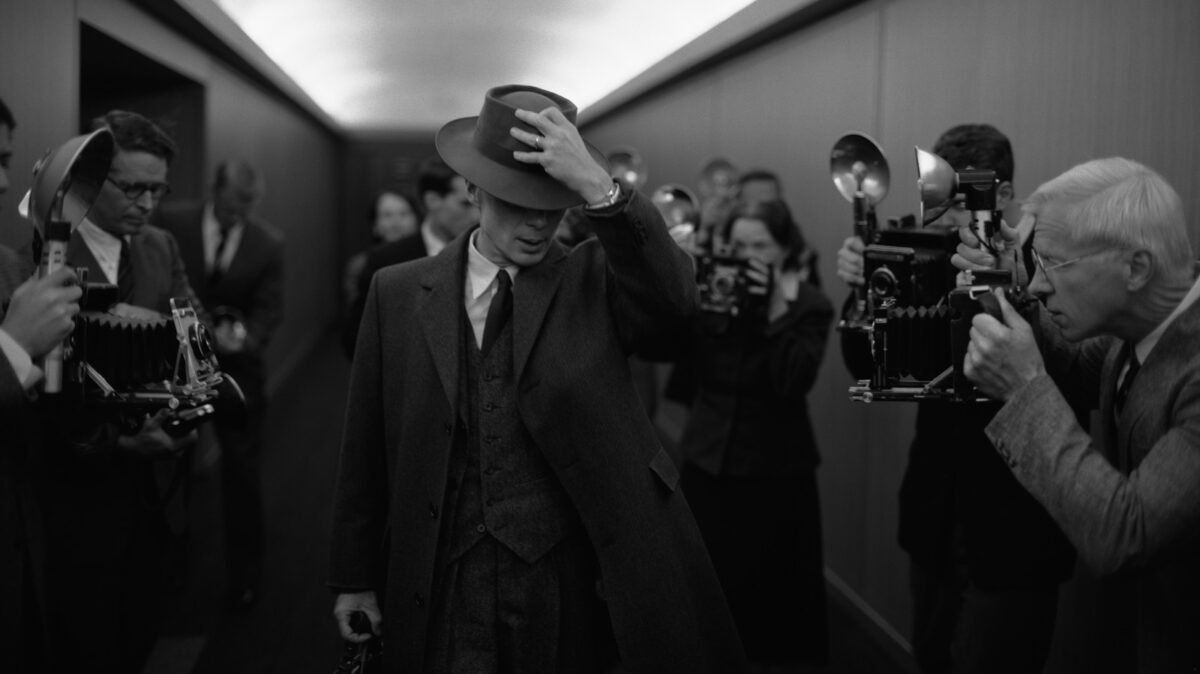It has now been a full month since Oppenheimer hit U.S. theaters, to which the response has been rapturous if not near unanimous: Oppenheimer is our first awards worthy, earth-shattering epic so far this year. With a scale so big that it demands to be seen in theaters, it’s brought the greater moviegoing world closer to a collective consciousness in how we interpret and talk about film again.
Much has been said about Oppenheimer in the days since: it’s taken over conversations at parties, dinner tables, offices with co-workers, to which most have graduated to the side of fascination rather than critique. The organic engagement has been rewarding, and finally a project such as Oppenheimer has brought film criticism back into the spotlight of contemporary film culture. But with all the commotion surrounding it, just like the nuclear bomb itself, what’s at the center of it? We’ve gotten so caught up with its scale and immersion, what is Oppenheimer really about?
That answer ties into who Oppenheimer was as a person. Much has been said about J. Robert Oppenheimer since the film’s opening and I’m sure to the shock of many in the scientific community, Oppenheimer is now spoken in the same way we speak of Jim Morrison – he’s become more popular in the afterlife than he was during his time here on Earth. He was a womanizer, charming, charismatic in a sophisticated way, and spoke seven languages. He was often apolitical, stuck his nose up at the notion that a human has to be defined by merely one thing, held multiple fascinations, and contained multitudes.
All this, however, also makes up Oppenheimer’s fatal flaw as a protagonist: he was never able to pick one side. His eccentricities and esoteric-ness prevented him from having an ability to choose between right and wrong. He always held a firm stance against permanency. Just like quantum physics, his relation to things we’re constantly evolving and in movement. He had far too curious of a mind not to explore every creative and scientific avenue he came across.
All of this leads to a fantastically flawed individual who would eventually come into conflict with what would be the ultimate choice between right and wrong. And in turn, the film reveals its ultimate story engine: temptation.

Oppenheimer faces temptation throughout the duration of the film, first example being when he poisons his mentor’s apple, which then continues into dabbling in multiple love affairs, which then leads to the curiosity of having the power of a collapsing star in his hand. The entire film encapsulates standing on the precipice of a void the world has never seen before – politically, socially, and personally – and the consequences that follow it. What’s another way of saying that you’re tempted? “I’m considering it.”
These complexities of a man faced with a critical decision leads us to the ultra-paranoid world we live in today. Nolan has given us the ultimate “fuck around and find out” movie. After the bomb came the Cuban Missile Crisis, then Chernobyl, then 9/11, gradually determining a world where security becomes more important than one’s individual freedom.
When all these elements are wrapped into the enigma of Oppenheimer, they ultimately contextualize what it means to be American: a constant push for a manifest destiny, to constantly push the envelope and explore what we thought we couldn’t explore before. Very much like how this country was formed, we find new territory and claim it as ours.
“How could this man who saw so much be so blind?” asks Lewis Strauss (Robert Downey Jr.). But Oppenheimer wasn’t blind. One could say that the entire country was blinded by the temptation of curiosity and the constant need to walk on fresh snow. That’s the American way. And with it, a legion of the world’s leading geniuses gathered in a desert and ultimately gave us the power to self-destruct ourselves. One of those scientists, Enrico Fermi, later went on to coin the Fermi paradox – the phenomenon of why humans haven’t been contacted by other intelligent beings, perhaps because they too discovered a way to self-destruct themselves before making contact outside of their planet. And out of our own human hubris, perhaps we, too, will come to have a similar fate.
Featured photo courtesy of Universal Pictures
